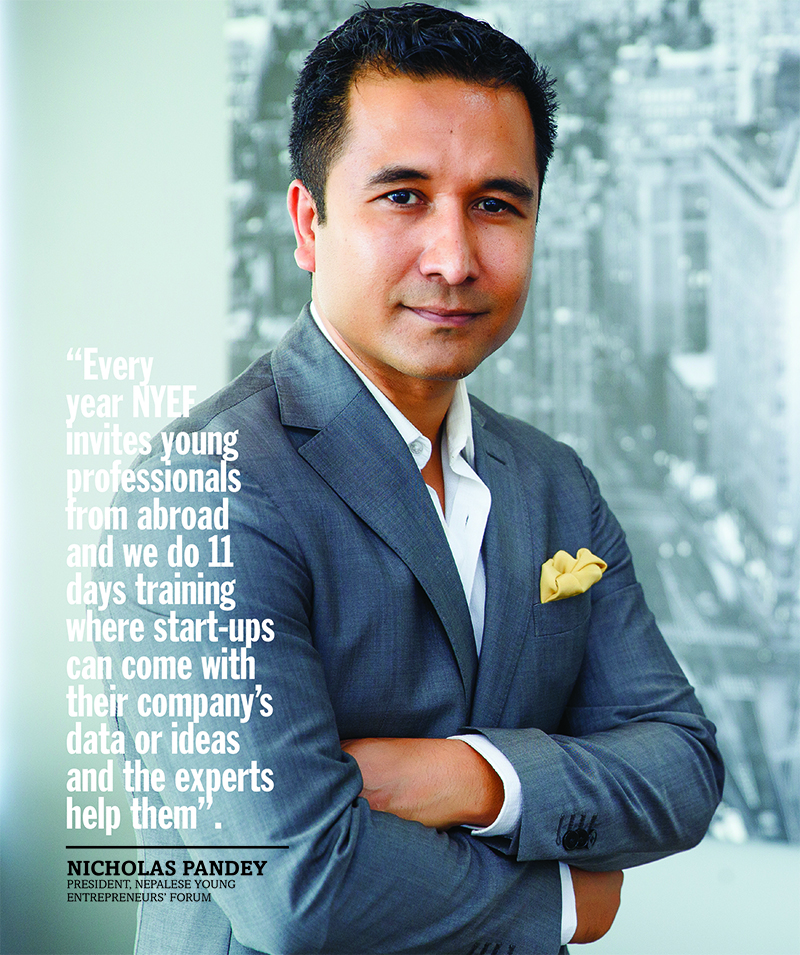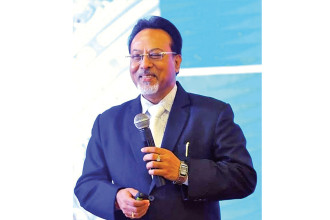
Nicholas Pandey is the President of Nepalese Young Entrepreneurs’ Forum which is a membership based non-profit organisation for young first generation entrepreneurs who want to create real business solutions and fill gaps through idea exchange, fellowships, education, training and advocacy among the Nepali youth.
Pandey completed his MBA from Copenhagen Business School and is also the Executive Director of Kalika Construction Pvt Ltd of the Kalika Group besides being the Managing Director of Kalika Energy, Executive Chairman of AAC Itta and Senior Vice President of Federation of Contractors Association of Nepal.
In an interview with Dibesh Dangol of B360, Pandey talks about the entrepreneurial landscape, the market gaps, the opportunities and what it is like to work with the government. Excerpts:
You recently became the President of NYEF. What plans do you have for the organisation and promoting young Nepali entrepreneurs?
NYEF has come a long way and this is its 16th year of operations. When it started, there were lots of limitations. Nepal was under the ‘People’s War’ and there was unavailability of resources to cater to the entrepreneurial system of Nepal. Still our seniors mustered strength and came together to started NYEF. For a long part of 16 years, it was more of people with family businesses who were part of NYEF. But, NYEF’s deep DNA is not just the younger generation of family businesses who come together in this ecosystem to work together; it is more for people who are first generation entrepreneurs and want to solve the real problem in business by finding the gaps and trying to fulfil it.
After I became the President, my first goal was to reach out to Nepali entrepreneurs, especially entrepreneurs outside Kathmandu valley, as much as possible. For this, we are establishing chapters in all seven provinces of Nepal and are trying to give more value to them.
To be a member of NYEF, the person has to be an entrepreneur, but at the same time there are so many shortcomings, especially in the entrepreneurial scene outside of Kathmandu Valley. They are missing on many entrepreneurial tools, which is why we try to give them value in terms of providing resource people who are already into similar businesses and who interact with them so that they can properly structure and streamline their business and can get maximum output from what they have.
Another thing that I want to do as the President is to enhance our relationship with the government and policy makers. Until now, NYEF has done very little to lobby for youth and entrepreneurial based policies. So, this year, we are trying to work closely with the government so that we can convince and show them that youth and entrepreneurship are the future of Nepal and our input in making friendly policies can assist a lot for the economic development of the country. The government funds are politicised and the funds for youth and entrepreneurs are not being used properly which is why we want to work closely with the government and make these funds accessible to the rightful stakeholders.
Last month, we had multiple meetings with the Minister of Labour and Employment, Gokarna Bista. NYEF along with Ministry are coming up with an employment convention where showcasing jobs and employment needed in the country will be discussed. There will be stakeholders of various business houses from different industries under one roof sharing about the type of manpower they need. This is a major step for NYEF as we begin to establish a relationship with the government.
What do you think of the current entrepreneurial landscape?
It’s in a very primitive stage but there are lots of sharp minds in the market. I have been able to interact with lots of young individuals who have great ideas especially in tech-related start-ups, but their main problem is funds. Our finance system doesn’t allow a person to get proper financial help unless you have collateral which is not possible for these young entrepreneurs. There are also boot-camps happening in Nepal but many of them haven’t been successful in terms of being able to connect the investors with the entrepreneurs. NYEF also does that but we also haven’t been able to reach out to a large mass of entrepreneurs. Though it is happening, it is happening at a very slow pace.
How is the current generation of Nepali entrepreneurs different from the older generation?
There is a huge gap. People from the older generation are more traditional in terms of business approach whereas the young generation entrepreneurs have brilliant ideas and modern business approach. First and foremost, the tech advancement has changed a lot and most of the ideas that I hear from the young entrepreneurs are based on tech. The way they approach business is very different and innovative.
I seriously think that the youths should be given opportunities to put their ideas into action.
However, having an idea is one thing but being able to execute it with perfection is another. Young entrepreneurs might not have the correct tools to structure their business because they have to start very slim and make sure whatever money they have, they utilise in a proper manner so that they don’t over or under spend the money. The main approach of business should be making a proper business idea, forecasting cash-flows and being able to execute the business properly. Start-ups might not have proper expertise in the beginning and might not have money to hire an expert to help them. That’s where we come in. Every year NYEF invites young professionals from abroad and we do 11 days training where start-ups can come with their company’s data or ideas and the experts help them.
What information should an entrepreneur have before starting or planning a business?

Today’s entrepreneurs are educated and/or exposed to modern education. If a person wants to start a business, firstly they should sit down in front of a drawing board and collect as much data as possible. Conducting industry analysis like knowing the size of the market, target customers, etc. is very important. These kinds of business development plans should be made in the beginning rather than starting a business on a hunch. Though there are lots of businesses who have succeeded like this, there are lots of businesses who have failed also. To manage the risk, entrepreneurs should know and gather as much information as they can with regard to their business.
What are the market gaps in Nepal where young entrepreneurs can succeed?
Agriculture is one of the sectors. Nepal is importing $2.5 billion worth of agricultural goods which is a huge amount. So, there is a potential of establishing $2.5 billion worth of agricultural industry in Nepal which young entrepreneurs can tap into. Though it’s not easy to get into agricultural businesses because of the involvement of middle-men and other challenges, today’s entrepreneurs are innovative, brilliant, and will have to device something that will make their business prosper.
Manufacturing is also an opportunity sector but a challenging one. Having said that, we import a lot and we are getting to the point where our economy might collapse. Even I am venturing a construction and manufacturing business. When it comes to infrastructure, Nepal is currently a developing country and the first priority of any developing country should be to invest in infrastructure. China started from infrastructure and then they ventured into manufacturing and trading businesses. Not only China, but all developed European and Western countries started from infrastructure. So absolutely, infrastructure and manufacturing are very important areas which haven’t been serious considered in Nepal.
Another gap is unavailability of skilled labourers; whether it is for household or construction purposes. About 1500 Nepalis leave for Middle-East countries every day, and if you go to the villages, you will hardly find males. Also, many youths are leaving our country everyday and very few are coming back. Nepalis find doing these jobs awkward when in Nepal but are fine doing similar jobs on foreign shores. We are living in a nation full of proud people and we judge the people by the jobs they do and the money they earn. This should change, and I am positive that it will gradually change as the younger educated population comes into place. At the same time, whatever job it is, employers themselves should respect their employees. Example: For labourers working on construction sites, employers should give them proper uniform and safety equipment so that they look respectable. If you see people working on construction sites abroad, they are wearing steel-toe boots, uniforms and have their own tools due to which they don’t look like they are doing manual jobs. Those types of things should also be incorporated in Nepal so that they feel respected and important at the job site as well as in their communities.
What is NYEF doing to support the spirit of entrepreneurship among the youth?
We are doing a lot of events everywhere. Especially, this time, we have been focusing on women entrepreneurship. We are travelling to various districts all over Nepal to find out what women entrepreneurs are doing, the difficulties they are facing, and their success stories. These women entrepreneurs might share similar stories in terms of difficulties they are facing or have had to face. So, we are creating a platform where female entrepreneurs can share their stories and learn from each other. We also organise Young Women Entrepreneurs’ Summit (YESW) every year and provide a platform for women entrepreneurs to network, learn and share.
Another activity NYEF is doing is connecting young upcoming budding entrepreneurs from outside of Kathmandu with premier self-made Nepali business people so that they can share their journey and inspire one another.
We are also organising Made in Nepal Expo which is our flagship event and this time we are planning to do it differently and make it more fun. The event is a movement with a message that every Nepali should contribute towards the country’s economy by promoting Nepali industries, and the main aim of the event is to bring behavioural change among the Nepali consumers so that they start consuming Nepali products and services. Last year we conducted the expo in Pokhara and Chitwan as well. We want to conduct this expo in other countries now but there are lots of hurdles regarding logistics and management. If we can overcome these, there are chances of conducting this expo in other countries as well.
Till now, we were not working closely with the government because every president of NYEF sets a priority and vision. Before, it was more about expanding across Nepal and consolidating various things. This year, we want to highlight NYEF in various media platforms so that people and entrepreneurs all over Nepal know about NYEF, the activities we do and the benefits entrepreneurs get by being affiliated with NYEF. This is because in the past NYEF used to be thought of as an organisation for big business houses which is not true at all. Though there are members who are associated with big business houses, we want to make clear that NYEF is for first generation budding entrepreneurs and small growth companies to help them elevate their companies to another level.
This year we have plans to get friendly with media houses and platforms to spread the knowledge of what and who NYEF is. Secondly, we want to work closely with the government to lobby proper entrepreneurship policies so that the funds that government separates for entrepreneurship can get into the hands of the right people and entrepreneur.






